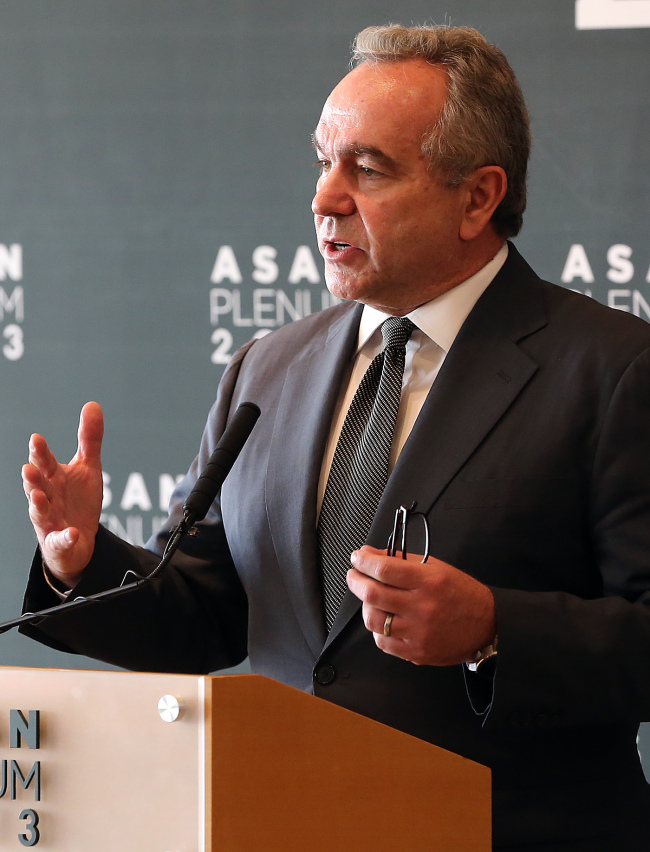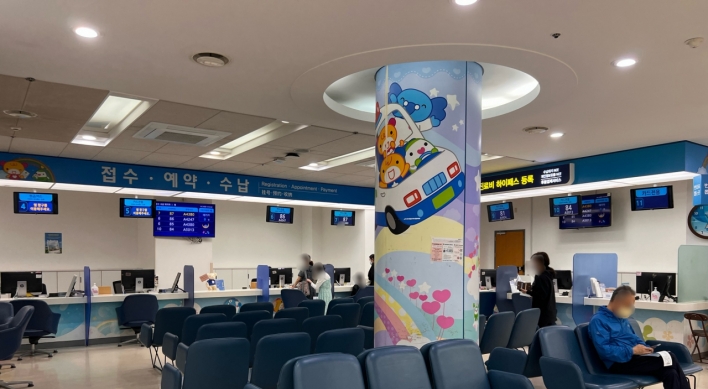‘China shows shift in strategic thinking on North Korea’
Campbell stresses China’s role to rein in Pyongyang
By Korea HeraldPublished : April 30, 2013 - 20:38
A series of recent provocations from North Korea has led to an apparent realignment in Beijing’s strategic thinking about its ally, a former senior U.S. diplomat said Tuesday, stressing the crucial role of China to rein in Pyongyang.
During a forum hosted by the Asan Institute for Policy Studies, Kurt Campbell, former assistant U.S. secretary of state for East Asian and Pacific affairs, noted that U.S. security officials perceived Pyongyang’s nuclear and missile developments as posing a serious security threat to the U.S.
“What we have seen is a subtle change in the approach in Beijing with respect to North Korea. It is clear that they are voices inside China that are beginning to realize that North Koreans’ activities are deeply antithetical to China’s interests,” he told a press conference.
During a forum hosted by the Asan Institute for Policy Studies, Kurt Campbell, former assistant U.S. secretary of state for East Asian and Pacific affairs, noted that U.S. security officials perceived Pyongyang’s nuclear and missile developments as posing a serious security threat to the U.S.
“What we have seen is a subtle change in the approach in Beijing with respect to North Korea. It is clear that they are voices inside China that are beginning to realize that North Koreans’ activities are deeply antithetical to China’s interests,” he told a press conference.

Although he did not expect a full-fledged change in Chinese thinking about the North, Campbell, who now leads the consulting firm Asia Group, added China’s diplomacy would change in some way.
“I think China’s diplomacy will shift in tone and texture more toward some of the dialogues China traditionally had, shall we say, with the Philippines, Vietnam and now Japan when they are unhappy ― a slightly tougher tone,” he said.
Touching on the withdrawal of the South Korean workers from the inter-Korean joint industrial complex, Campbell said it was not a serious “watershed” event, and underscored the difficulty of constructing diplomatic solutions to deal with the communist state.
“I don’t think what is taking place in Gaeseong marks a watershed in the way the shelling of Yeonpyeongdo and the sinking of the (corvette) Cheonan did in the past,” he said, referring to two provocations in 2010 that claimed the lives of 50 South Koreans.
“However, the accumulation of basically serial provocations has caused a quiet rethinking in a variety of capitals about just how difficult it is to construct any engagement strategy with North Korea that could bear fruit.”
Campbell emphasized China’s role for more effective international pressure on the North to behave as a responsible member of the international community.
“I think the most important first step is these tougher steps and potential sanctions actually signal very clearly to China that their own interests are at risk here. I think the first persuasion is not to Pyongyang but to Beijing.”
The former diplomat, credited as the architect of Washington’s policy of rebalancing toward the Asia-Pacific, countered the criticism that what analysts called the U.S. policy of “strategic patience” failed to yield visible progress on a range of issues regarding the provocative North.
“Some put the blame on the lack of creativity, inventiveness or determination in Washington or Seoul for the lack of progress in engagement with North Korea. I think that completely overlooks serial destabilizing provocations that North Korea has taken against us that led to a loss of life, higher nuclear tensions and proliferation concerns,” he said.
“So I think the lack of progress on the Korean Peninsula has to be laid very clearly on the doorstep of Pyongyang over the course of the last four years.”
Campbell also expressed Washington’s concern over Japan’s rightward political shift which has soured its ties with Seoul and China and hampered the mood of multilateral cooperation critical to maintain the region’s economic dynamism.
“I think the general watchword of diplomacy in Northeast Asia, frankly, is that in most circumstances, history is best left to the historians. Ultimately, I have confidence two democratic peoples (South Korea and Japan) with a strong interest in peace and stability in Northeast Asia will find a way to improve relations,” he said.
“With Europe slowing and the U.S. still recovering, Northeast Asia is in the cockpit of the global economy and these certain steps (China and Japan have taken over a territorial dispute) have the potential to have a cascading global effect ― something that no one wants in Tokyo, Beijing and Washington.”
Campbell also reiterated that Pyongyang should enhance ties with Seoul first, should it want to have a better relationship with Washington, stressing that the U.S. would not allow the North to “play out South Korea and the U.S.”
By Song Sang-ho (sshluck@heraldcorp.com)
-
Articles by Korea Herald




![[Grace Kao] Hybe vs. Ador: Inspiration, imitation and plagiarism](http://res.heraldm.com/phpwas/restmb_idxmake.php?idx=644&simg=/content/image/2024/04/28/20240428050220_0.jpg&u=)

![[Herald Interview] Mom’s Touch seeks to replicate success in Japan](http://res.heraldm.com/phpwas/restmb_idxmake.php?idx=644&simg=/content/image/2024/04/29/20240429050568_0.jpg&u=)


![[News Focus] Lee tells Yoon that he has governed without political dialogue](http://res.heraldm.com/phpwas/restmb_idxmake.php?idx=644&simg=/content/image/2024/04/29/20240429050696_0.jpg&u=20240429210658)









![[Today’s K-pop] Seventeen sets sales record with best-of album](http://res.heraldm.com/phpwas/restmb_idxmake.php?idx=642&simg=/content/image/2024/04/30/20240430050818_0.jpg&u=)